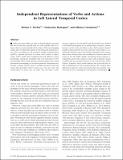| dc.contributor.author | Peelen, Marius V. | |
| dc.contributor.author | Romagno, Domenica | |
| dc.contributor.author | Caramazza, Alfonso | |
| dc.date.accessioned | 2014-03-07T18:33:05Z | |
| dc.date.issued | 2012 | |
| dc.identifier | Quick submit: 2014-02-19T21:00:09-05:00 | |
| dc.identifier.citation | Peelen, Marius V., Domenica Romagno, and Alfonso Caramazza. 2012. “Independent Representations of Verbs and Actions in Left Lateral Temporal Cortex.” Journal of Cognitive Neuroscience 24 (10) (October): 2096–2107. | en_US |
| dc.identifier.issn | 0898-929X | en_US |
| dc.identifier.uri | http://nrs.harvard.edu/urn-3:HUL.InstRepos:11870385 | |
| dc.description.abstract | Verbs and nouns differ not only on formal linguistic grounds but also in what they typically refer to: Verbs typically refer to actions, whereas nouns typically refer to objects. Prior neuroimaging studies have revealed that regions in the left lateral temporal cortex (LTC), including the left posterior middle temporal gyrus (pMTG), respond selectively to action verbs relative to object nouns. Other studies have implicated the left pMTG in action knowledge, raising the possibility that verb selectivity in LTC may primarily reflect action-specific semantic features. Here, using functional neuroimaging, we test this hypothesis. Participants performed a simple memory task on visually presented verbs and nouns that described either events (e.g., "he eats" and "the conversation") or states (e.g., "he exists" and "the value"). Verb-selective regions in the left pMTG and the left STS were defined in individual participants by an independent localizer contrast between action verbs and object nouns. Both regions showed equally strong selectivity for event and state verbs relative to semantically matched nouns. The left STS responded more to states than events, whereas there was no difference between states and events in the left pMTG. Finally, whole-brain group analysis revealed that action verbs, relative to state verbs, activated a cluster in pMTG that was located posterior to the verb-selective pMTG clusters. Together, these results indicate that verb selectivity in LTC is independent of action representations. We consider other differences between verbs and nouns that may underlie verb selectivity in LTC, including the verb property of predication. | en_US |
| dc.description.sponsorship | Psychology | en_US |
| dc.language.iso | en_US | en_US |
| dc.publisher | MIT Press - Journals | en_US |
| dc.relation.isversionof | doi:10.1162/jocn_a_00257 | en_US |
| dash.license | LAA | |
| dc.title | Independent Representations of Verbs and Actions in Left Lateral Temporal Cortex | en_US |
| dc.type | Journal Article | en_US |
| dc.date.updated | 2014-02-20T02:01:47Z | |
| dc.description.version | Version of Record | en_US |
| dc.rights.holder | Alfonso Caramazza | |
| dc.relation.journal | Journal of Cognitive Neuroscience | en_US |
| dash.depositing.author | Caramazza, Alfonso | |
| dc.date.available | 2014-03-07T18:33:05Z | |
| dc.identifier.doi | 10.1162/jocn_a_00257 | * |
| dash.contributor.affiliated | Caramazza, Alfonso | |


